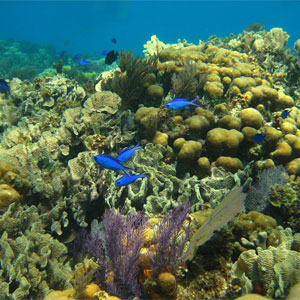 |
| Coral reefs are the most biologically diverse marine eco-systems on earth. |
For years, scientists couldn’t agree on what was causing the alarming degradation of coral reefs worldwide. Is it climate change? Overfishing? Run off from agriculture? Sewage outfall?
‚ÄúThe degradation of coral reefs is well documented, yet the underlying causes remain debated,‚Äù says Camilo Mora, post-doctoral fellow at ª∆…´÷±≤•.
But a new study authored by Dr. Mora and Robert Ginsburg at the University of Miami took an in-depth look at coral reef ecosystems in the Caribbean and concluded coral reefs are in decline due to their proximity to human activity. The study has just been published in Proceedings B, a prestigious biological research journal from The Royal Society.
“In essence, all the factors — climate change, overfishing, agricultural land use — affect the reefs the same amount,” says Dr. Mora, reached in his native Colombia. “And all these factors are related to each other because they are caused by humans.”
Human expansion in coastal areas has exacerbated the damage to coral reefs, incredibly rich ecosystems which act as home base for millions of marine species. Intense coastal development inevitably leads to more fishing, more pollution and more agricultural land use.
“The greater the number of people living close to the coral reef, the more degraded the reef,” says Dr. Mora.
The study monitored coral reefs, including corals, fish and macro-algae, in 322 sites across 13 countries throughout the Caribbean. The study was complemented with a comprehensive set of socioeconomic databases on human population density, coastal development, agricultural land use and ecological databases, with information on water temperature, hurricanes and coral diseases.
Researchers discovered links between coastal development and stressors on the biodiversity of reefs. With more development, for example, comes more fishing, leading to a loss of fish. Fish, in turn, feed on algae. With fish depleted from the food chain, algae is likely to grow unchecked and choke out other species. Nutrient run-off from agricultural land use and sewage outfall also contributes to macro-algae abundance.
Human settlement is inevitably accompanied by changes in land use and the exploitation of natural resources. “The increasing production of greenhouse gases to supply an increasing demand for energy is leading to increases in temperature,” notes the study. Water, even just one or two degrees warmer, causes bleaching and mortality in corals and other species in the reef ecosystems.
“The future of coral reefs in the Caribbean depends on how soon countries in the region become seriously committed to regulating human threats,” says Dr. Mora.
